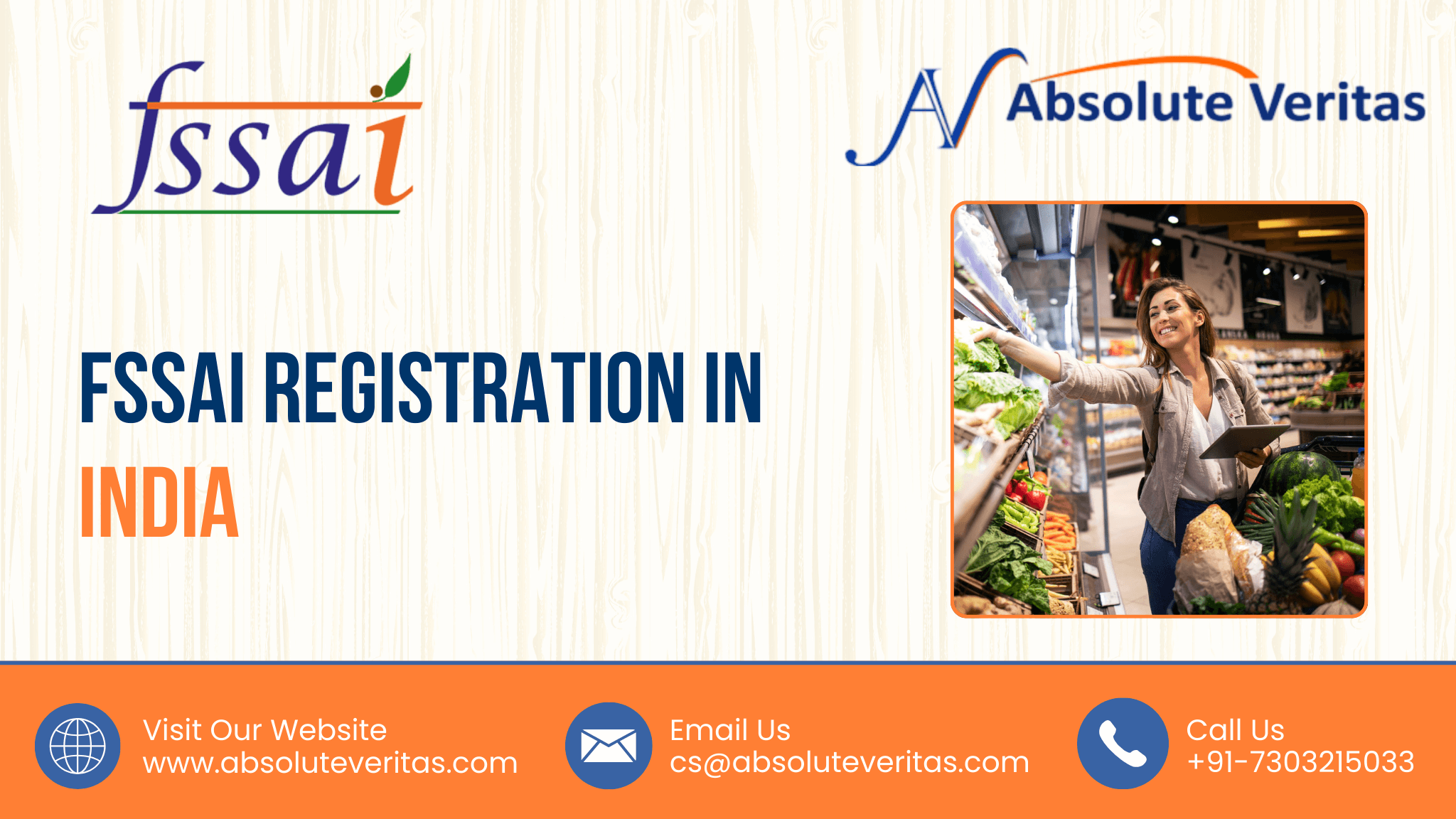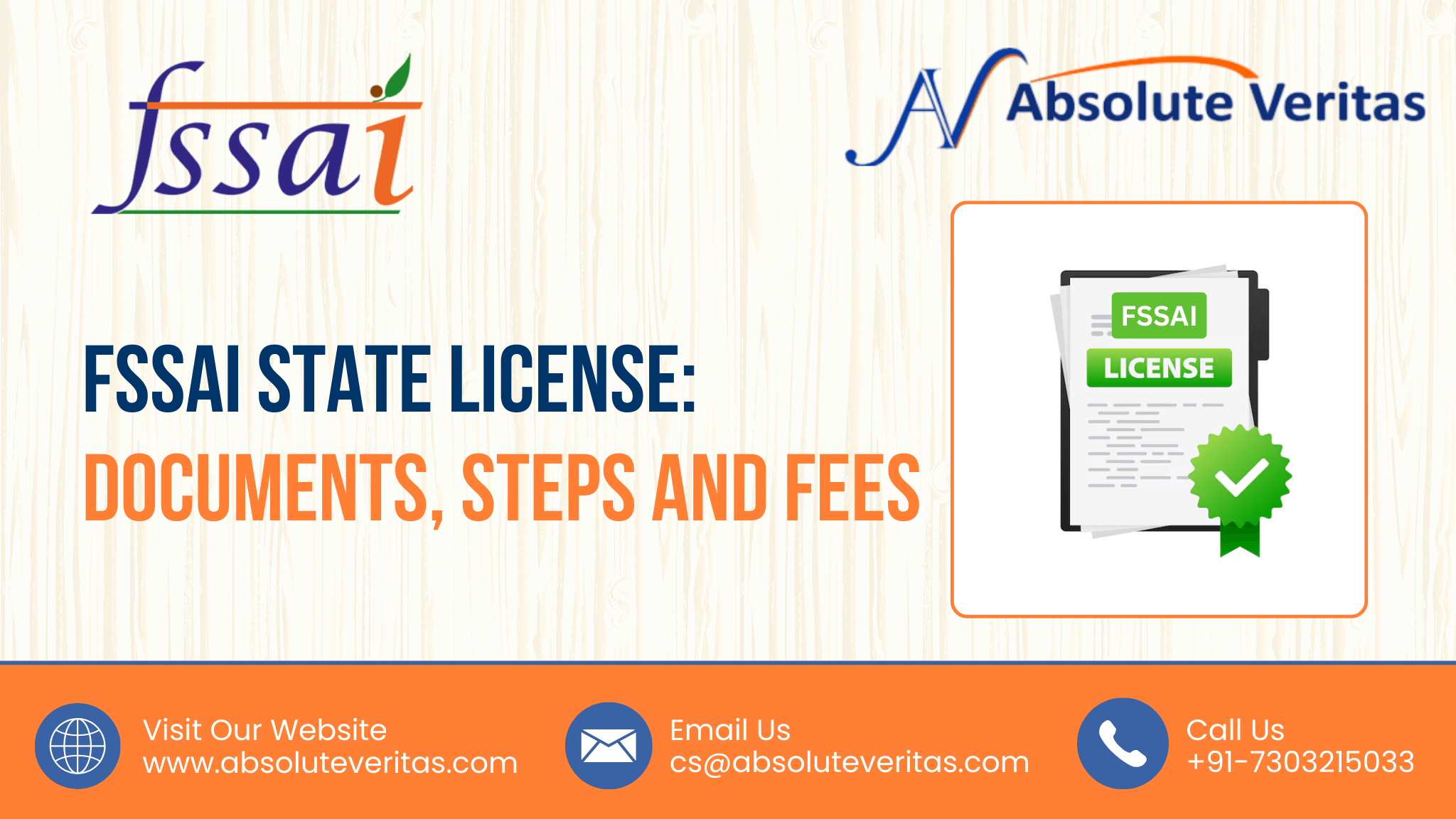Tel: 0129-4001010 Phone: +91 730 321 5033
Email: cs@absoluteveritas.com
FSSAI CERTIFICATION
Table of Content
.jpg)
INTRODUCTION
FSSAI: Despite the growing demand for the food industry, consumers still face reliability issues. Adulteration, additives, and contamination remain significant concerns. The Indian government established the Food Safety and Standards Authority of India (FSSAI) to address these challenges. FSSAI oversees food manufacturing, storage, packaging, and handling practices of food businesses. Its primary objective is to regulate and ensure food safety, thereby protecting and promoting public health.
This regulatory body oversees India's food industries, ensuring compliance with government regulations. Its responsibility includes verifying the purity and meeting specified requirements of food products. It works to eliminate substandard food items.
WHAT IS FSSAI?
FSSAI, short for the Food Safety and Standards Authority of India, is an autonomous organization established under the Ministry of Health & Family Welfare, Government of India. It was instituted by Former Union Minister Dr. Anbumani Ramadoss on August 5, 2011, in accordance with the Food Safety and Standards Act of 2006, which became effective in the same year.
The Food Safety and Standards Act of 2006, aimed at enhancing food hygiene and quality, has brought about substantial transformations in the food industry. The authority operates six regional offices located in Delhi, Guwahati, Mumbai, Kolkata, Cochin, and Chennai. As per the provisions of the Act, no individual can initiate or conduct a food business without acquiring an FSSAI license or registration. Consequently, any entity engaged in the manufacturing, processing, packaging, or distribution of food is now required to obtain an FSSAI License or Registration.
TYPES OF FSSAI REGISTRATION/LICENSE
FSSAI in India issues the following three types of license
1. FSSAI Basic Registration License - The State Government provides a basic Registration license to operators in the food industry, including small-scale manufacturers, storage units, transporters, retailers, marketers, and distributors with an annual turnover of less than Rs. 12 lakh. This license is valid for a minimum of 1 year and a maximum of 5 years. The registration process can be completed in just 7 days.
2. FSSAI State License - This license is issued by the State Government to small and medium-sized enterprises (SMEs) including transportation, storage facilities, distributors, marketers, etc. The company must operate within a single state and have an annual turnover of at least Rs. 12 lakh. The license is valid for a minimum of one year and a maximum of five years. The process of obtaining a state license from the FSSAI typically takes 15 days.
3. FSSAI Central License - The Central Government issues this license. Food business operators (FBOs) with operations in multiple states must obtain a Central License for their headquarters. This license is applicable to FBOs with an annual turnover exceeding Rs. 20 crore. It has a validity period of one to five years. The processing time for this license is typically 25 days.
FUNCTIONS OF FSSAI
The Food Safety and Standards Authority of India (FSSAI) performs the following functions:
1. Setting Rules and Guidelines -FSSAI establishes regulations and standards that must be adhered to by all food manufacturing companies, prioritizing hygiene and food safety.
2. Granting License - To engage in any food-related business, owners must obtain certification and licensing with approval from FSSAI.
3. Test the Standard of Food - Food-producing and manufacturing companies undergo thorough inspections to ensure compliance with the established guidelines and standards.
4. Regular Audits -
5. Spreading Food Safety Awareness -FSSAI raises awareness and educates citizens about the importance of consuming safe and hygienic food.
6. Maintain Records and Data -FSSAI is also responsible for maintaining accurate records and data of all registered organizations. Violations of FSSAI rules can lead to the revocation of licenses.
7. Keeping the Government Updated -Report any food safety-related threats to government authorities for necessary action and assist in formulating food standard policies.
WHAT ARE THE DOCUMENTS REQUIRED FOR FSSAI REGISTRATION?
The documents required for an FSSAI License vary based on its type. However, some key documents needed include:
-
Proof of address
-
Manufacturing process flowchart
-
Manufacturing layout plan
-
Brand certification document
-
Testing facility details
-
Equipment inventory
-
Premises ownership proof
-
No Objection Certificate (NOC) from municipality and local body
-
NOC/PA issued by FSSAI
-
Contact information of Directors
-
FSSAI Declaration form
-
Source of milk (if applicable)
-
Premises ownership proof
PROCEDURE FOR FSSAI REGISTRATION
The process of FSSAI Registration in india begins with gathering the essential documents required for registration.
1. Online submission of application -After obtaining the necessary documents, the subsequent step involves creating an online portal on the FSSAI website and submitting the registration application to the food safety department through the online platform.
2. Submission of (hardcopy) application -Additionally, it's essential to submit a hard copy of the application along with the required documents to the Food and Safety department.
3. Scrutiny -FSSAI officials will review the application, and within seven days of submission, the department will either approve or reject it.
4. Inspection from FSSAI - Following document verification, FSSAI Officials may opt to conduct an audit at the applicant's premises.
5. Grant of FSSAI Certificate - Upon approval of the application, the department will issue a registration certificate containing the applicant's registration number and photograph.
Sample of Grant Certificate for FSSAI
 (1).jpg)
FOR WHOM FSSAI LICENSE IS MANDATORY IN INDIA
Whether you're starting a food processing, trading, repacking, wholesaling, marketing, canteen, or restaurant business, obtaining an FSSAI license is essential. According to the regulations outlined in the Food Safety and Standards Act, 2006, it is mandatory for the following entities to acquire FSSAI Registration or License.
-
Food manufacturers of all kinds
-
Suppliers of raw food materials
-
Importers and exporters of food products
-
Units involved in food storage and packaging
-
Food traders and merchants
-
Retailers of food products
-
Online operators in the food business
-
Catering services and hotels
-
Transporters and distributors of food products
-
Wholesale operators in the food business
TIMELINE FOR FSSAI LICENSE
The timeline varies based on the type of license, outlined as follows:
-
Basic license: Approximately 7 days
-
State License: Approximately 15 to 30 days
-
Central License: Approximately 30 to 60 days
RENEWAL OF FSSAI LICENSE
The license is valid for a period of 1 to 5 years, depending on the application fee paid. It must be renewed at least 30 days before its expiration date.
For any questions regarding the most recent update on Fssai licenses, please reach out to us via email at cs@absoluteveritas.com
Fssai Blogs

FSSAI REGISTRATION IN INDIA
FSSAI Basic Registration is designed for small food and beverage businesses with an annual turnover of up to Rs. 12 lakhs...
Read More
FSSAI STATE LICENSE : DOCUMENTS, STEPS AND FEES
FSSAI State License is essential for Food Business Operators (FBOs) involved in manufacturing, storage, transportation, retail...
Read More<
>
FREQUENTLY ASKED QUESTIONS
What is FSSAI?
FSSAI, an abbreviation for the Food Safety and Standards Authority of India, is the regulatory body governing registered food businesses in India.
What does FSSAI do?
The mandate entrusted to the Food Authority includes establishing science-based standards for food items, monitoring the entire spectrum of food operations from manufacturing to distribution and import, and facilitating comprehensive food safety measures.
What are the benefits of procuring an FSSAI License?
Acquiring an FSSAI License offers numerous advantages such as instilling consumer trust in your food brand/products through the display of the FSSAI Logo and officially formalizing your food business.
Who needs an FSSAI Registration/License?
Various entities involved in the food business, including manufacturers, distributors, wholesalers, marketers, suppliers, retailers, takeaway outlets, home-based kitchens, canteens, dhabas, hawkers, importers, exporters, clubs, and others, require FSSAI Registration or License.
What is the FSSAI License number?
The FSSAI License number is a 14-digit identifier that provides essential information about the food business owner. It must be displayed along with the FSSAI logo on food package labels. Importers must also display the FSSAI logo, license number, and their name and address for imported food products.
Why might an application for an FSSAI License be rejected?
Applications may face rejection if the required information is not provided within the stipulated 30-day timeframe.
How can one obtain food license registration online?
To facilitate online food license registration, interested parties can reach out to service providers like Absolute Veritas, catering to various cities such as Mumbai, Delhi, and others.
What is the validity of a food license?
The validity of an FSSAI License ranges from one year to five years. After this period, businesses need to apply for FSSAI License renewal.
Do I need a separate food license for each state?
Yes, separate FSSAI licenses are required for each state. Businesses need a Central FSSAI license for their main branch or head office, and State FSSAI licenses for operations in specific states.







 ❮
❮
